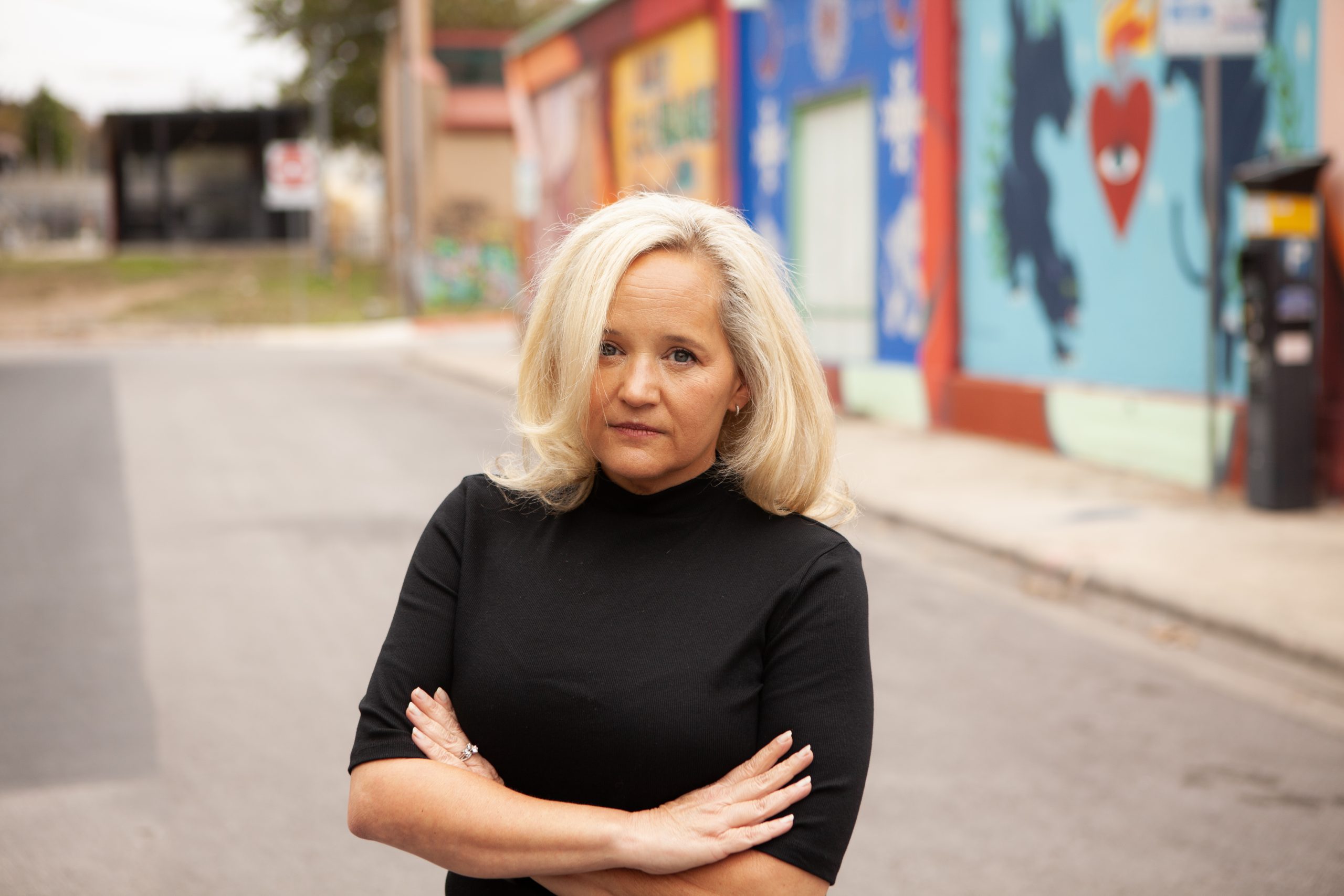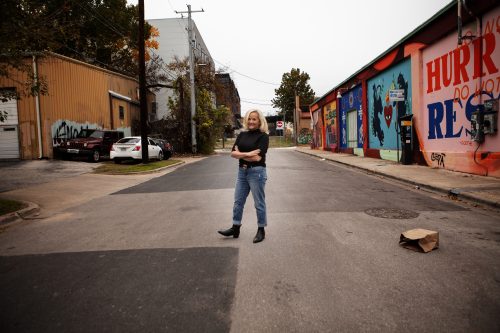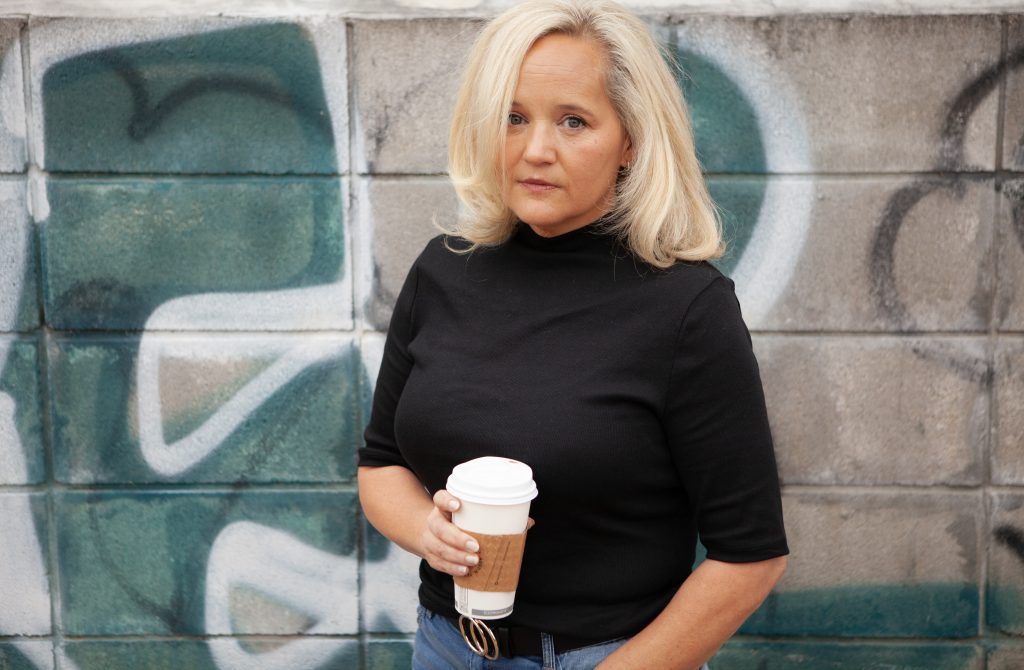Chief of Change
Catherine Johnson helped lead the Austin Police Department’s push to recruit more women.

Catherine Johnson says mentorship is invaluable. "I’ve been very fortunate to have some great men and women who have taken an interest in me and my career. I think that’s imperative in any business or career path — find somebody you can respect and learn from." Photo by Kirk Weddle
Chief of Change
Catherine Johnson helped lead the Austin Police Department’s push to recruit more women.
When she served on the force, Catherine Johnson ’95 said she was often chosen to work undercover because she did not look like a police officer.
At 5-foot-1, her short stature meant she approached situations differently from her peers — and relied on her social work training from TCU. “I can’t tell you how many times I’ve defused the situation just by simply listening to somebody,” she said.
After graduation, Johnson started her career in juvenile probation. She joined the Austin Police Department in 1999. “I was always fascinated with law enforcement, and especially working in undercover,” she said.
Johnson started as a patrol officer and said she loved how every day held something different. “That time in my life was probably the most fun I’ve had in my career.”
In 2003, Johnson was promoted to detective, investigating cases involving physical and sexual abuse of children. “That part of my career was most rewarding,” she said. “There is nothing like putting a child predator in prison for a very long time.”
Over the years, Johnson held many roles and was chosen for the FBI National Academy’s prestigious three-month leadership program.
In 2021, she was promoted to assistant chief, where she served until her retirement in June 2022.
Women in Policing
Johnson worked in recruiting for the Austin Police Department when she first heard of the 30×30 Initiative. Police departments that choose to sign the pledge commit to raising their percentage of female law enforcement officers to 30 percent by 2030 and to making police culture more inclusive.
Nationwide, women make up only 12 percent of the force — and only 3 percent of leadership positions. “To me, that’s unacceptable,” Johnson said. “There’s so much that women can bring to the table regarding any career, but especially in law enforcement.”

Catherine Johnson joined the Austin Police Department in 1999 as a patrol officer. She retired last year as assistant chief of police. Photo by Kirk Weddle
Research compiled by 30×30 shows that female officers are more trusted by the community, use less unnecessary force than their male counterparts and promote positive outcomes for crime victims, including higher rates of sexual assault reports and offender arrests.
Johnson brought the 30×30 Initiative to Anne Li Kringen, the training academy division manager at the Austin Police Department, and together they proposed it to Austin Police Chief Joseph Chacon. He was immediately on board.
In March 2022, Austin became one of nine Texas police departments and nearly 200 in the U.S. to sign the pledge. Johnson led efforts to promote 30×30 within the Austin Police Department and in the media, acting as spokesperson for the initiative.
Barriers to women in policing are not about talent, but department culture, said Kringen, a member of the 30×30 steering committee. Limited childcare opportunities or restrictive haircut policies may cause quality candidates to drop out.
Austin Police Department officials are making the department more equitable and appealing for women through leadership seminars, recruitment programs and marketing strategies.
Johnson is excited to see the changes. “It sounds really cheesy, but it’s for my daughter,” she said. “I want to make the path a little bit smoother for women in any type of career.”
Building Better Officers
Johnson’s toughest test as an officer came in 2021, when she took on a new role restructuring the police training academy.
After city reports raised concerns about the academy’s culture and effectiveness, the Austin City Council shut down the academy until changes could be made. The department tapped Johnson and Kringen to establish a new system.
In Johnson, Kringen said she found a valuable work partner in the fellow mom. “She’s warm and bubbly, and kind of puts you at ease — but yet she also, being a police officer, really has this ability to kind of flip a switch and take sort of a business leadership tone when she needs to get things done.”
The two women replaced the academy’s traditional military-style approach with an adult learning atmosphere. Kringen focused on the curriculum while Johnson was more people-oriented, reassuring recruits about the changes and pushing through initiatives in the department.
They often faced pushback from other officers for challenging longstanding traditions, but Johnson pressed forward even when it was difficult. “She knew that this might produce a better police officer, this might produce a better way of someone serving their community,” Kringen said.
Johnson and Kringen were so successful that their work was featured on 60 Minutes and contributed to Johnson’s promotion to assistant chief. Johnson said other departments requested their blueprint for the program.
“Police officers, really, we don’t like change too much,” Johnson said. “As law enforcement executives and leadership, [we] have to be able to adapt.”

“Make sure the people who work for you are taken care of. Treat everybody with dignity, respect and how you would want to be treated.” – Catherine Johnson. Photo by Kirk Weddle
Forever a Frog
More than half of Johnson’s family attended TCU, including her father, a psychologist, who inspired her to look after others. “I was born purple,” she said.
Her grandmother Inez was the dorm receptionist at Colby Hall, where she and Beth Watson ’95, her friend and sorority sister, roomed in 1991. As a student, Johnson was hardworking and engaged on campus, Watson said.
Today, Johnson’s daughter lives in Colby Hall as a first-year student. “I was really excited when my daughter decided to join the [Frog] family,” Johnson said.
Johnson is still determining her plans post-retirement, but she’s excited to attend more TCU events and be a soccer mom for her son in high school.
Looking back, Johnson said her biggest achievements were not accolades or promotions. “It’s leaving knowing that I left my career at least helping people.”
Johnson shared some of the lessons she’s learned as a leader and law enforcement officer.
Seek out a mentor. I’ve been very fortunate to have some great men and women who have taken an interest in me and my career. I think that’s imperative in any business or career path — find somebody you can respect and learn from.
Some women think they just can’t do it. And that is not the case. If I could do it, anybody can do it. You don’t have to be 6-foot-1, 200 pounds to be a police officer. You can do these things. And that’s the great thing about law enforcement: Police departments are going to invest in you and they’re going to teach you how to protect yourself and how to protect the community.
Some days are going to be really sad. There are going to be some really hard days; there are going to be some really hard calls. But the good days always, always outweigh the bad. If you know why you’re there and you know what your purpose is and what your career path is, then it’s all worth it in the long run.
I think the most important thing is to be a good listener. You must be able to listen and communicate with people, not only with other police officers, but also with the community. Sometimes people just need someone to listen.
Make sure the people who work for you are taken care of. Be transparent, and be a good communicator … treat everybody with dignity, respect and how you would want to be treated.

Your comments are welcome
1 Comment
It’s always interesting to read about the different careers of TCU alums!
Related reading:
Alumni, Features
Sai Tuialii Fights Crime in South Los Angeles
The police sergeant returned to his hometown after playing basketball for TCU.
Alumni, Features
Crowdsourcing Can Lead to Solving Crimes with Police
Johnny Nhan analyzed how citizens banded together on platforms like Reddit to find the Boston Marathon bombers.